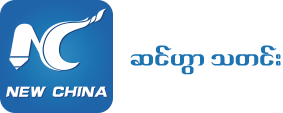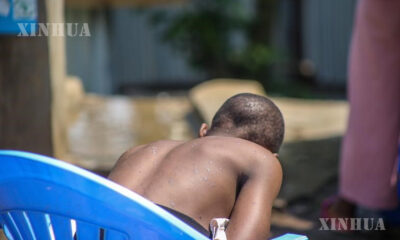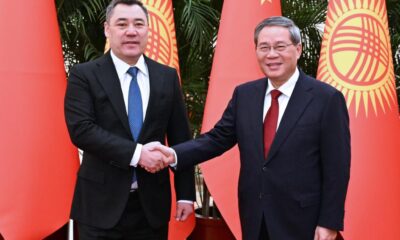International Organizations
ကမ္ဘာ့ပထမဆုံး ငှက်ဖျားရောဂါ ကာကွယ်ဆေးအား ကျယ်ကျယ်ပြန့်ပြန့်အသုံးပြုရန် WHO ထောက်ခံ

ဂျီနီဗာ၊ အောက်တိုဘာ ၇ ရက် (ဆင်ဟွာ)
ကမ္ဘာ့ပထမဆုံး ငှက်ဖျားရောဂါကာကွယ်ဆေး RTS,S/AS01 (RTS,S) ကို အာဖရိက ဆာဟာရဒေသခွဲရှိ ကလေးငယ်များအတွက် ကျယ်ကျယ်ပြန့်ပြန့် အသုံးပြုရန် ကမ္ဘာ့ကျန်းမာရေးအဖွဲ့ (WHO) က ထောက်ခံထားကြောင်း အောက်တိုဘာ ၆ ရက်က ပြောကြားခဲ့သည်။အဆိုပါ ကာကွယ်ဆေးသည် ဗြိတိသျှ ဆေးဝါးကုမ္ပဏီ GlaxoSmithKline (GSK) က နိုင်ငံတကာအကျိုးအမြတ်မယူသောအဖွဲ့အစည်း Program for Appropriate Technology in Health (PATH) နှင့် အာဖရိကရှိ သုတေသနစင်တာများကွန်ရက်တို့နှင့် မိတ်ဖက်ပြုကာ နှစ် ၃၀ ကြာ သုတေသနနှင့် ဖွံ့ဖြိုးတိုးတက်မှုရလဒ်လည်း ဖြစ်သည်။
၎င်းတို့၏ ထောက်ခံချက်သည် ၂၀၁၉ ခုနှစ်ကတည်းက ဂါနာ၊ ကင်ညာနှင့် မော်လဝီ စသည့် ရှေ့ပြေးအကောင်အထည်ဖော်မှုနိုင်ငံများမှ ကလေးငယ် ၈၀၀,၀၀၀ ကျော်အား ထိုးနှံပြီးဖြစ်သော ကာကွယ်ဆေး ၂.၃ သန်းကျော်မှ ရရှိလာသော ရလဒ်များအပေါ် အခြေခံထားခြင်း ဖြစ်ကြောင်း WHO က ဆိုသည်။
အဆိုပါ သုံးနိုင်ငံရှိ ကလေးငယ် သုံးပုံနှစ်ပုံကျော်သည် ကာကွယ်ဆေး၏ အကျိုးကျေးဇူးကြောင့် ခြင်ထောင်ဖြင့်ပင် အိပ်စက်စရာမလိုဘဲ ပြင်းထန်ငှက်ဖျားရောဂါဖြစ်ပွားမှု ၃၀ ရာခိုင်နှုန်းခန့် ကျဆင်းသွားခဲ့ကြောင်း WHO အရ သိရသည်။
၎င်းကာကွယ်ဆေးသည် ဘေးကင်းစိတ်ချမှုရှိပြီး ခြင်ထောင်မထောင်ဘဲအိပ်စက်ခြင်း နှင့် ကလေးဘဝ အခြားကာကွယ်ဆေးထိုးနှံခြင်း သို့မဟုတ် အမျိုးမျိုးသောဖျားနာခြင်းအတွက် ကျန်းမာခြင်းအလေ့အကျင့်များ အပေါ် ဆိုးကျိုးသက်ရောက်မှုမရှိကြောင်း WHO က ဆိုသည်။
“ဒါက ဘေးကင်းပါတယ်။ အသက်သေစေနိုင်တဲ့ ပြင်းထန်ငှက်ဖျားရောဂါကို သိသိသာသာလျှော့ချပေးပြီး ကုန်ကျစရိတ်လည်း တော်တော်လေး သက်သာစေမယ်လို့ ခန့်မှန်းထားပါတယ်” ဟု WHO ညွှန်ကြားရေးမှူးချုပ် Tedros Adhanom Ghebreyesus က သတင်းစာရှင်းလင်းပွဲ၌ ပြောကြားခဲ့သည်။
“ငှက်ဖျားရောဂါနဲ့ ရောဂါဖိစီးမှု လျော့ကျစေဖို့ ကာကွယ်ဆေးကို ကလေးငယ်တွေ အသက် ငါးလအရွယ်ကစပြီး လေးကြိမ် ထိုးနှံဖို့လျာထားပါတယ်” ဟု WHO က ဆိုသည်။
ငှက်ဖျားရောဂါသည် ရောဂါပိုးရှိသော အနောဖလိခြင် (Anopheles mosquitoes) အမများ ကိုက်ခံရခြင်းမှတစ်ဆင့် လူသားများထံ ကူးစက်တတ်သော ကပ်ပါးပိုးများကြောင့် ဖြစ်ပြီး လူ့အသက်ကို သေစေနိုင်သော ရောဂါဖြစ်သည်။ ထိုရောဂါသည် ကြိုတင်ကာကွယ် ကုသနိုင်သည်။
WHO ၏ မှတ်တမ်းများအရ ငှက်ဖျားရောဂါသည် ဆာဟာရဒေသခွဲရှိ ကလေးငယ်ဘဝ ဖျားနာမှုနှင့် သေဆုံးမှု၏ ကနဦး အကြောင်းအရင်းတစ်ခုဖြစ်ကြောင်း၊ အဆိုပါရောဂါကြောင့် အာဖရိကရှိ အသက် ၅ နှစ်အောက် ကလေးငယ် ၂၆၀,၀၀၀ ကျော် နှစ်စဉ်သေဆုံးလျက်ရှိကြောင်း သိရသည်။
“အချိန်အကြာကြီးစောင့်ဆိုင်းခဲ့ရတဲ့ ငှက်ဖျားရောဂါကာကွယ်ဆေးဟာ သိပ္ပံပညာ၊ ကလေးသူငယ်ကျန်းမာရေးနှင့် ငှက်ဖျားရောဂါထိန်းချုပ်ရေးဆိုင်ရာ ထိုးဖောက်ကျော်လွှားမှုတစ်ခုဖြစ်ပါတယ်။ ကာကွယ်ဆေးက ကမ္ဘာကြီးအတွက် လက်ဆောင်ဖြစ်တယ်။ ဒါပေမဲ့ သူ့တန်ဖိုးကို အာဖရိကမှာ အများဆုံး ခံစားနိုင်မှာဖြစ်ပါတယ်။ ဘာလို့လဲဆိုတော့ အဲဒီမှာက ငှက်ဖျားရောဂါဖိစီးမှုဒဏ်ကို အကြီးမားဆုံးခံစားနေရတာကြောင့်ပါပဲ” ဟု Tedros ကပြောခဲ့သည်။ (Xinhua)
————————————————-
(English Version)
WHO recommends broad use of world’s 1st malaria vaccine
GENEVA, Oct. 6 (Xinhua) — The World Health Organization (WHO) said on Wednesday that it has recommended widespread use of the world’s first malaria vaccine called RTS,S/AS01 (RTS,S) for children in sub-Saharan Africa.
According to the WHO, the vaccine is the result of 30 years of research and development by British pharmaceutical company GlaxoSmithKline (GSK) in partnership with the international non-profit organization Program for Appropriate Technology in Health (PATH) and with a network of research centers in Africa.
The WHO said its recommendation is based on results from more than 2.3 million doses of the vaccine that have been administered to more than 800,000 children in pilot countries Ghana, Kenya and Malawi since 2019.
According to the WHO, more than two-thirds of children in the three countries who were not sleeping under a bednet were benefiting from the vaccine, bringing about a 30 percent drop in severe malaria.
The vaccine has a favorable safety profile, the WHO said, with no negative impact on the uptake of bednets, other childhood vaccinations, or health seeking behavior for febrile illness.
“It’s safe, it significantly reduces life-threatening severe malaria, and we estimate it to be highly cost-effective,” WHO Director General Tedros Adhanom Ghebreyesus said at a press briefing.
According to the WHO, “the vaccine should be provided in a schedule of four doses in children from five months of age for the reduction of malaria disease and burden.”
Malaria is a life-threatening disease caused by parasites that are transmitted to people through the bites of infected female Anopheles mosquitoes. It is preventable and curable.
The WHO’s records show that malaria remains a primary cause of childhood illness and death in sub-Saharan Africa. More than 260,000 African children under the age of five die from the disease annually.
“This long-awaited malaria vaccine is a breakthrough for science, child health and malaria control,” said Tedros. “This vaccine is a gift to the world, but its value will be felt most in Africa, because that’s where the burden of malaria is greatest.” Enditem
Photo taken on March 30, 2021 shows an exterior view of the headquarters of the World Health Organization (WHO) in Geneva, Switzerland. The WHO released a report on Tuesday following a joint research with China on the global tracing of COVID-19 origins. (Xinhua/Chen Junxia)






